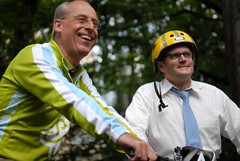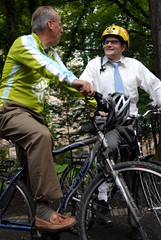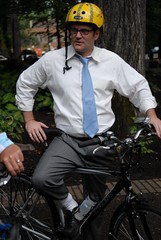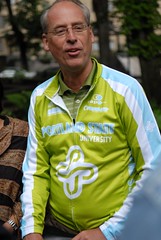
Sam Adams after their ride into work this
morning.
(Photos © J. Maus)
Newly hired Portland State University President Wim Wievel (say “Vim Vee-vul”) got an up-close look at what 2,000 of PSU’s students, faculty and staff experience every morning — a commute by bike.
Wievel, 57, rode approximately seven miles from his presidential residence (his house is owned by PSU) on SW Military Road (near Tryon Creek State Park) down into the South Park Blocks. Accompanied by Commissioner and Mayor-elect Sam Adams, the pair pedaled down Terwilliger, onto SW Barbur and eventually into downtown via SW 6th Ave.
At a press conference following the ride, I got a look at Wievel’s bike and riding attire. The bespectacled native of Amsterdam rolled in on a Gary Fisher Tiburon hybrid bike (probably 1-2 years old and with a front fork that was installed backwards) and he wore standard slacks, a polo shirt, and a long-sleeved PSU Cycling Team jersey.
Addressing a crowd of media and onlookers, Wiewel said, “It makes a difference what this university does and how we do it.” He and Adams spoke of having a close partnership in the months and years to come.
Reflecting on the ride in, Wievel said, “It’s a nice ride down, but getting back would have some challenges.” Wievel was being realistic about a ride home that would entail not just long sections of high-speed roads with only a bike lane, but some serious climbs that would be reason for pause for all but the strongest riders.
“It’s a nice ride down, but getting back would have some challenges.”
–Wim Wievel
When I asked them specifically about this morning’s ride, Wiewel mentioned a few instances where the bike lane “just disappeared… like when we rode under a bridge.” Adams said it has been “a few years” since he rode down Barbur Blvd. and he apologized to Wiewel for the overgrown brush in the bike lane. “We need to do something about that,” he said.
I asked them to elaborate on how their partnership might play out.
Adams said PSU’s Institute for Bicycle and Pedestrian Innovation (IBPI) will be important as PDOT looks to “establish” their bike boulevard program. “They’ll be great,” he said, “to make sure we get all the details right.”
[The IBPI is a transportation think tank whose mission to, “Enhance policies, programs, and projects that promote pedestrian and bicycle travel through research, education, and outreach.”]
Adams also mentioned that he’ll “rely on PSU” to be a major partner in the City’s “roll-out of a bike-sharing system next summer”.
Wiewel spoke about the construction of the new “bike center” (as part of the new campus Rec Center) and said he’s planning a symposium this spring on land-use and sustainability. He also added that he sees PSU’s role as being able to “further the knowledge” about transportation issues — and not only about bikes, but about other modes as well.
According to Wiewel, thinking beyond just bikes is important because, “Biking is a great solution, but it doesn’t work for everybody all the time.” Perhaps he was thinking of himself (and his daunting daily biking route) when he said that.
After the press conference, I pulled aside Ian Stude. Ian is the leader of PSU’s Transportation Options effort (he’s moved up a lot since his days as manager of PSU’s Bike Co-op). I asked him to tell me how Wiewel’s presidency might impact biking at the school.
“What we’ve seen at other universities is that when you have a strong influence at the top, that message trickles down pretty fast. I think we’re going to have a broad level of support both for the student and administrative initiatives we have coming up.”
According to Ian, the key focus areas are on-campus bike infrastructure, and the infrastructure that leads to campus.
On campus, Ian says, “we’re part of the way there”. He points to their new bike co-op that is set to expand into a full-service, Bikestation-esque facility and a secondary bike parking garage that’s in the works. “Between those two projects, we’ll have over 200 indoor bike parking spaces…I think that’s going to be a big leap forward and be a model for the city.”
But they’re not built yet, and Ian says Wiewel is, “the kind of influence we need to make sure those projects don’t find themselves facing a series of setbacks or delays.”
He cautions that, “Bicycles still have a history here at PSU of being value-engineered out when it comes to the cost for new buildings and facilities…so I think that we’re starting to see a change in that behavior.”
As as for off-campus bike infrastructure, Ian is happy that Wiewel’s ride this morning “might have showcased those challenges.” Largely a commuter school with many of their students coming from a five mile radius, Stude explained that they rely on PDOT’s bikeway system to, “tie into the university as much as possible… and I think we have some improvements to make there.”
Among those improvements? Ian thinks it’s time for a bicycle boulevard along the Park Blocks and an enhanced connection from the Hawthorne Bridge to the university. He also thinks improvements are needed for folks biking from the West Hills into campus, especially along Terwilliger and Barbur Boulevards and from the new built South Waterfront community.
“We’re going to have to work with our city partners to put the pressure on and make sure those improvements are made,” Ian said, “because that’s what’s really going to help us increase the amount of people coming to campus by bike.”
It will be interesting to watch how Wiewel’s tenure impacts bike conditions at PSU and downtown. He’s got the credentials, and soon, he and Mayor-to-be Sam Adams will be poised to be a dynamic duo. The emergence of these two leaders taking the helm as transportation becomes a key issue for our region (and our country), presents a lot of reasons for hope.
Now, let’s make sure that hope is realized.





